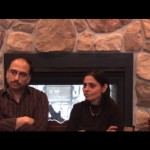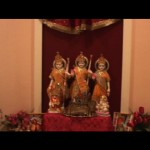Nirmal and Renu Joshi
Nirmal and Renu Joshi
Interview and Profile by Kesang Nepali
Video Recording by Tara Bhattacharyya
Interview conducted on 4/2/09, Mechanicsburg, PA
Drs. Nirmal and Renu Joshi are from the capital city of India, Delhi. Nirmal grew up in the hill resort town of Nainital and went to a Catholic school there. Renu was born, brought up and studied in Modinagar, a city close to Delhi. They met in medical school in Lucknow, in Uttar Pradesh and married after graduating. Nirmal came to the US in 1986, Renu followed a year later. They have two children whom they adore, one in college and the other still in high school. They are proud that they have raised their children to be American and yet retain their Indian identities.
Nirmal’s father was a surgeon in India. Renu’s father worked in the railways and her mother was a school teacher. Coming from highly educated backgrounds, it seemed only natural to them that they would pursue a high level of academic success.
Their initial reason for migration was to further their careers in medicine, to achieve more economic stability and also to escape the red tape and bureaucracy which was prevalent in India. The opportunity to live in a more free and open society was also what appealed to the Joshis. Renu, particularly describes that the feeling of “I can do anything here in America” was the charm of the country. They are now very successful physicians in the Harrisburg area.
They were prepared to face the American work environment before migration, with help from Nirmal’s brother, who was living in the US. But they were surprised by the quiet social environment that people led in the US. They saw no people on the road, there were no daily family gatherings and things were “inherently very quiet” in comparison to India. They missed the Indian culture, with a large family structure and the bustling social activities. But they quickly settled down in their new home in the urban Maryland area. They faced yet another culture shock when they moved to the suburbs of the Hershey area, which was even quieter and had almost no Indian population in comparison to where they had lived in Maryland. But again, they adapted well and loved the quietness of this new area. In time the Indian population in the Hershey area grew and they found themselves as busy as any other Indian family in India engaged in cultural, religious and social activities.
Some of the other surprises they had were at work when they initially arrived in the US. They were unfamiliar with certain American medical slang and so, had some very amusing experiences . They acknowledge that they are keeping up with the new American non-medical vocabulary with the help of their children.
They did leave the US in 2000 to live in India permanently with the hopes of raising their children in a more Indian style. To their surprise, they found that India had changed. They realized they were able to raise their children to be more Indian in the US, than by living in India.They also found a lack of morals in the work environment and disrespect for women and the poor that led them to believe that they had not made the best choice in moving back to India. Considering all of this, they migrated back to the US for the second time after living in India after a year and a half.
[flv]http://mosaics.dickinson.edu/southasian2009/wp-content/uploads/sites/13/2009/04/raising-indian.flv[/flv]
Both Nirmal and Renu’s parents visited often and their mothers later moved to the US. They feel that their parents have also played an important role in teaching their children the Indian values and culture. Although most of their families are now in the US, they still feel an unexplainable bond with India and visit at least once a year. Nirmal says “…I get this thing about once a year, about….just wanting to go back…it’s beyond visiting the country…” Even their children love visiting India and are proud of their Indian heritage.
[flv]http://mosaics.dickinson.edu/southasian2009/wp-content/uploads/sites/13/2009/04/joshinchildren.flv[/flv]
Nirmal has gone beyond visiting their homeland by creating a mini-museum with a wall dedicated to his life in India. From old Bollywood records to posters of Indian actors and singers and his old school uniform, he has displayed all the important memorabilia of his life before he came to the US. A beautiful painting of the Nainital lake in the center of this wall shows him the “window to his past,” so he is never far from his homeland.
The family maintains their cultural and religious roots by visiting the HARI temple often and offering prayers every morning in their home shrine. They are very Indian in the sense that they have family and relatives visiting all the time, engage in the Indian community’s activities, speak Hindi at home, eat Indian food and pass on the values and morals they believe are necessary for their kids to be truly Indian. Nirmal feels that the home his family has created here might be in fact “ better than home (India)”. They are very comfortable with their lives here and identify themselves as Indian, Indian- American and Hindu.
Renu says that they have done a full circle: leaving India for the US, going back to live there and again coming back. So they are now very confident that they would like to spend the rest of their lives here. Nirmal says, “Home is where really where you’ve made it to be. This place has given us so much. It’s a tremendous country that has given us so much that in keeping with our Indian roots, to be thankful for what we have and who has given that to us, I think is very much…in the same spirit that we treat America as our home.…roots will never change.”
[flv]http://mosaics.dickinson.edu/southasian2009/wp-content/uploads/sites/13/2009/04/fathersashes.flv[/flv]


